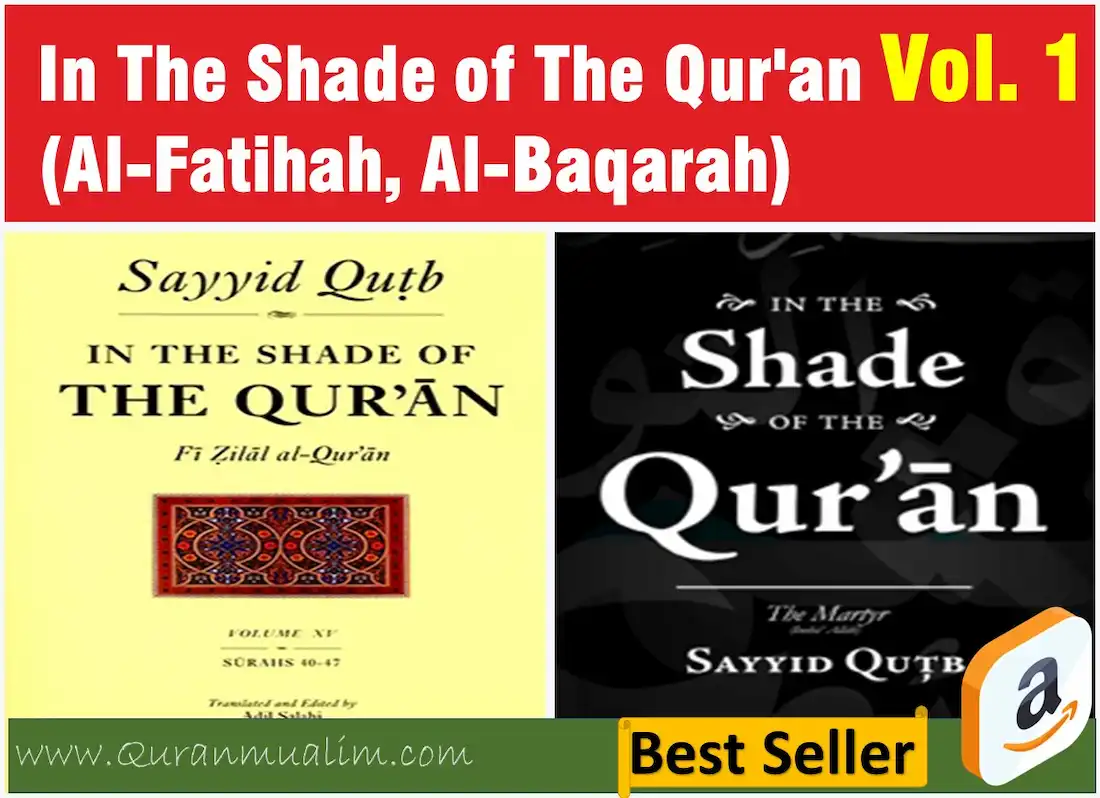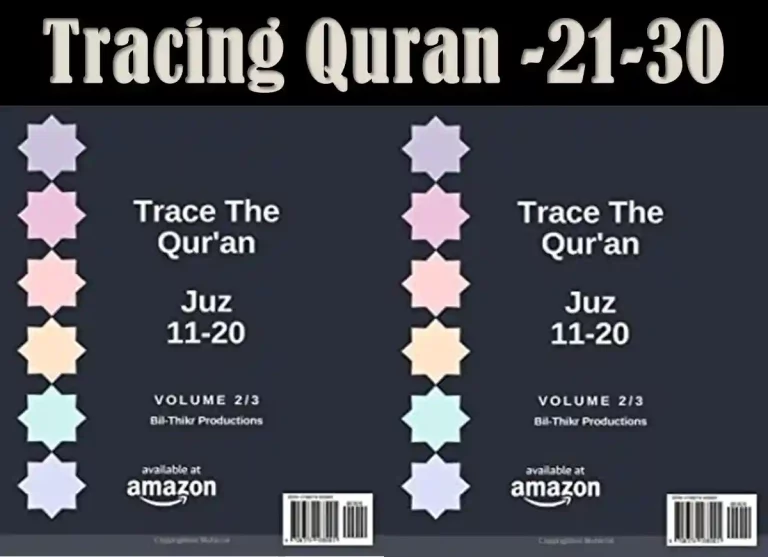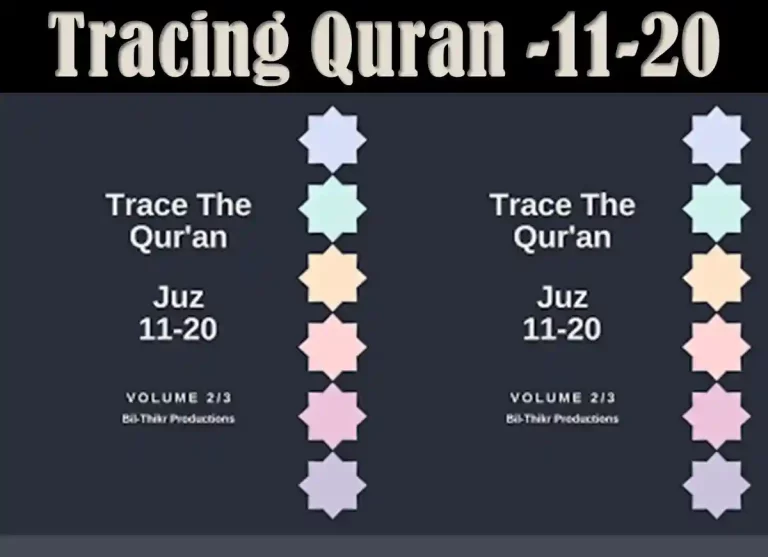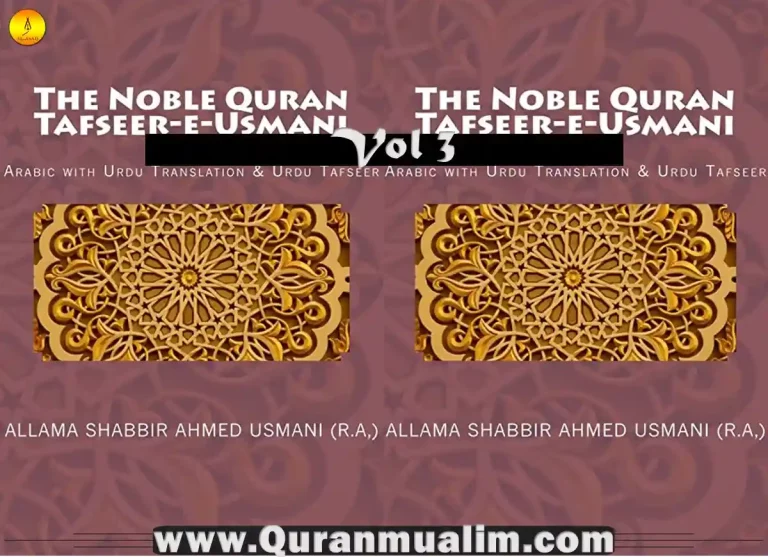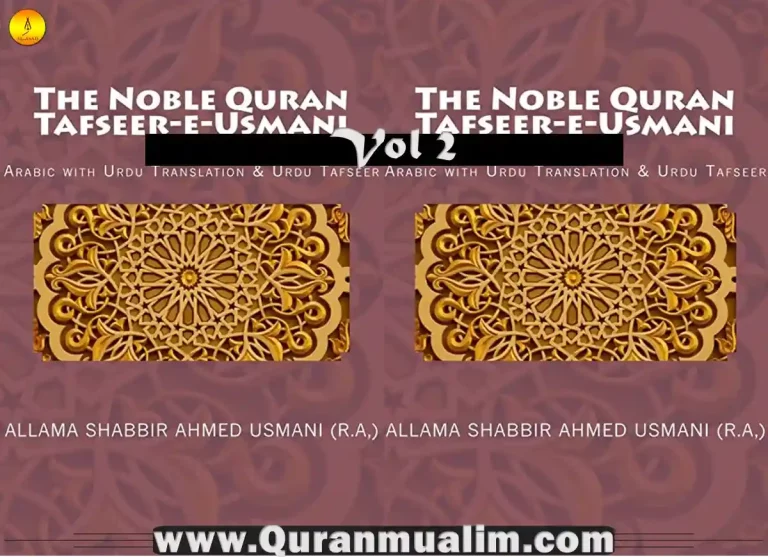“From the 1960s through the present, few Muslims, even those who have qualms, doubt that In the Shade of the Qur’an represents a remarkable intellectual achievement. John Calvert, associate professor of History at Creighton University, author of Sayyid Qutb: The Origins of Radical Islamism
“Widely considered one of the most important Qur’anic commentary Aries of the 20th century. “–Muhammad Mojlum Khan author of The Muslim 100, and The Muslim Heritage of Bengal
This commentary on the whole Qur’an explores its rich wisdom in an engaging and clear style. It is widely recognized as an important work of reference that can be used to understand contemporary Islamic thought, especially the interpretation of Qur’an during the 20th century.
Qutb’s commentary is focused on the timeless messages of the Qur’an and attempts to remind and affirm the value and essence of faith. It does not focus on legalistic issues but rather focuses on the spiritual and practical aspects of faith. This emphasizes the moral and socio-economic benefits of each command, as well as their roles in individual and collective life.
Each chapter begins with an introduction that summarizes the main message of each surah. Each chapter is also divided by topic to highlight the most important themes in an organized manner.
SUGGESTED READ : Online Quran Teacher For Kids and Color Coded Quran , Can Muslim Men Wear Gold? , Can Muslims Have Dogs?, Can Muslims Have Dogs?, Allah is The Best Planner,
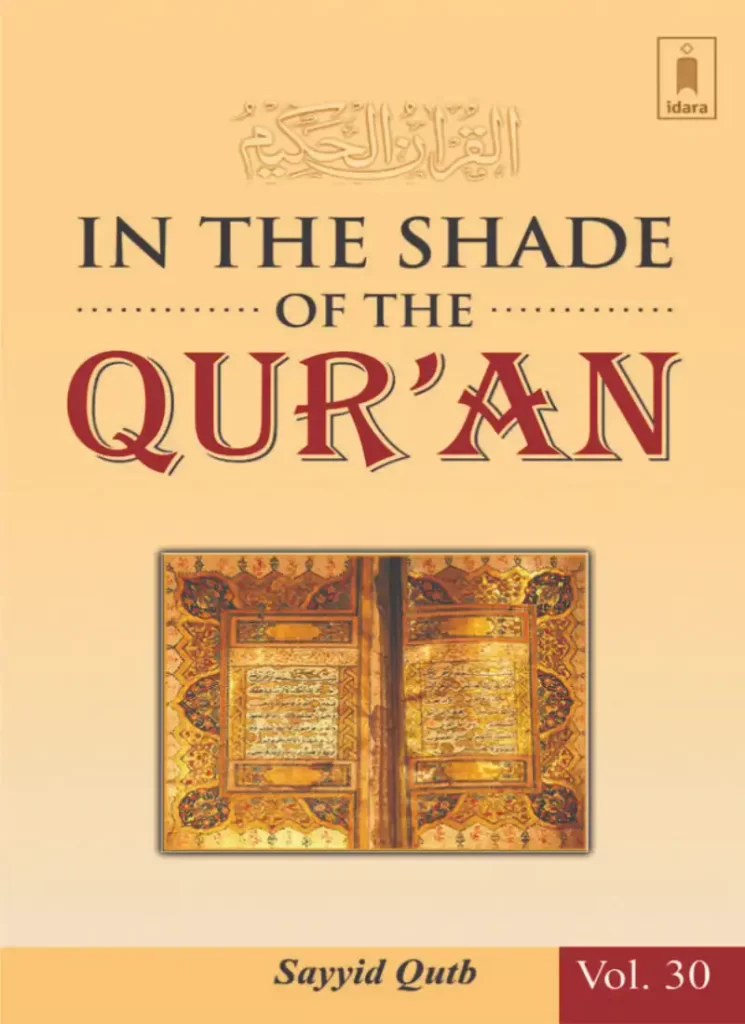
Al-Fatihah (The Opening) – IN THE SHADE OF THE QUR’AN
Surah (Surah) is the name for a Qur’an unit. Although ‘chapter’ is the closest English equivalent, surah is used in Arabic to refer only to Qur’an units. It has been retained in English. There are 114 surahs in the Qur’an of different lengths.
Overview
This short surah, which consists of seven verses, is recited by every Muslim at least seventeen times per day. A hadith from the Prophet Muhammad (peace and blessings be upon him) states: “A prayer made by someone who has not read the Fatihah will not be accepted.”
This brief surah contains many of the fundamental ideas and concepts of Islam. It describes many of the essential views and attitudes. It is clear that it is important for prayer’s validity and is a good choice for frequent recitation.
The surah begins with the phrase
In the name God, the Merciful, the Compassionate. (Verse 1)
Most scholars recognize this as a verse in the surah. It completes its verses into seven. However, there is some disagreement over whether this is true for all the other Qur’an surahs in which the same words appear at the beginning of each verse. Some scholars believe that this Qur’anic statement is directed to Fatihah: “We have given seven oft-repeated verses as well as this sublime Qur’an.” (15:87).
The first verses of Qur’an that Prophet Muhammad was shown begin with the following: “Read in name of your Lord ” (96: 1) This establishes the Islamic etiquette for invoking God’s name at the beginning of any action. This is in accordance with the fundamental Islamic principle of God being “the first and last, the inward and outward.” (57, 3) God is the true being, the source and raison d’etre for all things. Therefore, all movements and actions are made in His name and everything starts in His name.
All aspects and meanings of mercy are covered by the divine attributes of al-Rahman (the Compassionate) and al-Rahman (the Merciful), and they can only be combined with God Almighty. Although it would be appropriate to refer to a human being with the attribute al-Rahim, the Islamic faith demands that al-Rahman only be used to describe God. The debate about which adjective denotes mercy or compassion is not our concern. However, we can conclude that they all encompass mercy when taken together.
The first principle of Islam is to invoke God at the beginning of all actions. Therefore, the second principle defines the relationship between God (God) and man.
After invoking God’s name, acknowledging His infinite mercy, it is time to praise God and acknowledge His absolute sovereignty over all things:
All praise be to God, Lord of all the universes. (Verse 2) – IN the SHADE OF QUR’AN
The first emotion that a believer feels when God is mentioned is praise of God. Man’s existence is an aspect God’s infinite grace. This engenders gratitude to God and reverence for Him. Every moment is filled with the manifestations of God’s generosity and munificence to man and all other creatures. Another fundamental principle of Islam is to praise God at both the beginning and end of each action. According to the Qur’an, “He is God; there’s no other deity than He.” He is worthy of praise in the first and last …” (28.70)
Suggested Read: Quran French, The Quran: English Translation, Textual Criticism and Qur’an Manuscripts, The Clear Quran, El Coran and The Essential Book of Quranic Words

IN THE SHADE OF QUR’AN
God’s grace means that when a believer shouts, “praise be God,” it is recorded as a good deed. Umar ibn al-Khattab is the Prophet’s Companion. He tells how a man once said to God, “Lord! I praise You as befits Your Majesty and the greatness Your Power.” God Almighty instructed them to record the remark in their records as he said it. I will reward him as he merits when he returns home to Me.
The verse’s last phrase, “Lord over all the worlds,” expresses belief in an absolute, universal Godhead that is central to the Islamic idea of God. God is the ultimate, sole, absolute and ultimate owner of the universe. He has full authority to act in all aspects of the cosmos. He is the supreme master of the universe and continues to oversee it, care for it and ensure its stability.
This dynamic and living relationship between God and creation is the constant fountain of life for all things. God did not create the world to be left alone. He is still an active, living authority over His creation and gives it the necessary resources to continue its meaningful existence. This is true for all God’s creations.
Under the shade of Qur’an
Recognizing God’s absolute Lordship is the key to clarity and confusion in relation to God’s absolute Oneness. Many people combine their recognition of God as the creator with their belief that multiple deities have authority over their lives. Although it may seem strange that anyone would believe such a thing, it was common in the past. According to the Qur’an, those who believe that they only worship minor gods (39:3) are mentioned. (9: 31). Polytheism was a form of worship that involves worshipping multiple deities or demigods, in addition to the perceived ‘Grand Deviity’.
Al-Fatihah (The Opening)
To ensure rationality and peace of thought, man needed to affirm the absolute sovereignty of the One God and his active authority over all creation. It is important to know that God is a caring and vigilant God and will not abandon this world.
The world was filled with erroneous beliefs, philosophies and false religions at the time of Islam’s birth. It was not all true, nor even rational. There was a lot of confusion about the idea of God and His relationship to man and the world. This confusion led to confusion in man’s understanding of the world, as well as his position and role within it.
Under the shade of Qur’an
Only when we look at the darkest periods in human history without such a system, do we see how important it is to have a consistent, rational, and clear system of beliefs. This is when we realize the weight of false beliefs and myths on mankind. This will be discussed more when we study particular Qur’an instances.
In light of this need, Islam has taken great care in correcting man’s beliefs. It also clarifies the concept and nature God and His attributes and the relationship between Creator & creation.
This idea is expressed in the Islamic concept God’s Oneness, which is the core and most fundamental principle Islam. It has taken great care to establish and clarify the assertion that God is the One, absolute, transcendent Master and Lord of all that exists. Islam has also paid great attention to the concept of God’s attributes. This aspect has caused much confusion and obfuscation throughout the centuries, as well as muddled philosophical and religious thinking.
In the shade of the Qur’an
It is difficult to appreciate the intensity, emphasis and detail that Islam has shown in dealing with God’s Oneness and all related subjects, given the context of so many erroneous beliefs, confused theologies, and the history of human history. This perspective allows Islam to be seen as a timely and profound act of divine mercy. It is a mercy that is full of beauty, simplicity and harmony and is in complete accordance with our human nature.
The Merciful, the Compassionate. (Verse 3)
These two attributes encompass all aspects and meanings of mercy and compassion and are a symbol of mercy as God Almighty’s property. These attributes are the link between God Almighty and His creation. This link is built on love, peace and reassurance. It inspires a feeling of gratitude and praise towards God.
Contrary to Greek mythology and the Old Testament (Genesis 4: 1112), Islam doesn’t depict God as an antagonist who pursues man relentlessly or plots against His creation with spite or vindictiveness.
Master of the Day of Judgement. (Verse 4) – IN THE SHADE of the QUR’AN
This verse outlines a fundamental Islamic principle which has profound implications for human life: belief that there is a afterlife. The Qur’an reflects on the paradoxical fact that while people believe in God the Creator, they have not believed in the Day of Judgement. This is a time when punishment and reward are combined to restore justice.
The Qur’an refers to these people by saying: “If they ask them, “Who created the heavens, and the earth?” (31:25). Elsewhere, the Qur’an states that such people consider it strange that a warner should come from their own midst. The unbelievers respond, “A strange thing is it!” [Are we to be raised] after our deaths and becoming nothing? This seems very unlikely. (50: 2-3).
Under the shade of Qur’an
Because it engages the mind and focuses man’s attention on the future, belief in the hereafter becomes essential. This helps man to stop obsessing about the present and transcend his immediate earthly needs. He doesn’t need to be anxious about securing all his rewards now. Instead, he can overcome his selfishness and pursue altruistic interests and feelings. You can be a positive, optimistic, patient, and motivated person.
This central Islamic belief clearly distinguishes between the desire to attain moral and intellectual freedom and surrender to worldly and selfish pleasures and desires. It is the distinction between an intelligent, conscientious and well-balanced humanity and one that seeks self-gratification and egotism.
If people don’t believe that the things they have earned in this short-lived life are the only thing that matters, human life will never be balanced or equitable. The incentive for man to believe that there is another life ahead of him must be a positive belief. It makes a profound difference in the attitudes, feelings, and behavior of people who believe it.
Only You are worthy of worship, and only You can help us. (Verse 5) – IN THE SHADE of THE QUR’AN
This verse explains another fundamental principle, which follows logically from those before it. This principle is crucial and decisive. It draws a distinction between freedom that man gains by submitting to God, and the abuse and debasement inherent in man’s servitude.
When a man submits himself to God and seeks His guidance and help, he is free from all the tyranny of intellectual, moral, political, and religious powers.
The believer in Islam sees human power as two types: rightly-guided, which recognizes God and follows His instructions, and arrogant, rebellious, that denies God’s sovereignty or authority. The Muslim must support and endorse the former regardless of how weak or disadvantageous it may be and reject and oppose any attempt to overthrow the latter, no matter its power or dominance.
According to the Qur’an, “Many a small group, by the grace God has defeated a large one.” (2: 249). Such victory for the seemingly weaker host can only be achieved when it rely on God, who is the source of all power.
A Muslim’s attitude towards natural forces is one of curiosity, friendliness and not fear or hostility. Both the natural and man-made powers are viewed as by-products and subjects to God’s will. These two powers are therefore perfectly complementing each other and interdependent.
Under the shade of Qur’an
Islam teaches us that God created the world and all its elements for our benefit. The world is taught to man specifically and directed to help him understand it, find its potential, and use all that he finds for his benefit and the good of others. Nature is the only thing that causes man harm. The more man understands nature, the more harmonious and peaceful his relationship with it and the environment.
The idea of “conquering Nature” is therefore easily interpreted as negative and cynical. It is contrary to Islamic beliefs and reveals a shameless ignorance about the spirit that created the world and the divine wisdom it reflects.
Muslims are open to God’s role in shaping the world and have a positive, constructive, and friendly view of man’s relationship to nature. It simply acknowledges God as Creator and origin of all these forces on the basis the same set axioms.
They were designed to work together for a common purpose in harmony, compatibility and mutual support. They are subservient to man who is mentally and physically able to see and understand the secrets of nature and then harness their power to enhance the quality of human life. According to the Qur’an, “He has all that’s on the earth subservient for you.” ((45.13)
This outlook removes any traces of fear and isolation, and instead creates a deep sense of belonging that allows man to be seen as not only an integral part of the overall world design but also as an incredibly effective and influential member.
His world becomes friendly. This was best expressed by the Prophet who once confronted Mount Uhud, the scene for a bitter defeat to Muslims. He said, “How do we love this mountain and how does it love us!” This exemplifies the mutual affinity that the Prophet felt towards nature, even in its most rough forms.
These fundamental principles being established, the surah points out the path to practical ways of responding to them. Prayer is the most important.
We need to follow the straight path, the path of those upon whom You have bestowed favors. Not those who have suffered Your wrath nor those who have gone astray.(Verses 6-7)
These words are a plea for help and guidance. God is the only way to show a believer the Right Way. Recognizing that is a sign of God’s sovereignty over all events and things.
The right way of living is the key to happiness, both in this world as well as in the future. It is achieved by guiding the human nature, man’s desires and inspirations towards the recognition and comprehension the divine will. This allows the human activity to be in sync with the natural order of the world and the physical world.
Surah describes the nature of the “straight way” as it is taken by those God has chosen, and not by those who have deviated from the Truth or those who are ignorant of it. It is the path to happiness and salvation.
This is al-Fatihah. It is the surah that should be recited daily. Without it, Islamic prayers will not be valid. It is short but contains the most important principles of Islam and some insights.
According to reliable reports, the Prophet Muhammad said that God shared the fruits of prayer equally between Me (the Lord of all the worlds) and My servant (the one who will grant what he requests). The worshipper will recite [in Prayer]: “Praise to God, the Lord all the worlds” and God will respond: “My servant has praised me.”
God will respond to him as he recites: “The Merciful, the Compassionate”
He said: “Guide me on the straight track, the path of those upon whom You have bestowed Your favors. Not those who have incurred your wrath nor those who are going astray.” God will reply: “This is for my servant, and he shall be granted his wish.
This hadith explains some of the meanings and uses of al-Fatihah. It may be helpful for the reader to understand why God chose this surah to be recited by Muslims at least 17 times per day as they stand up for their obligatory prayers spread throughout the day and night, and more often when they offer voluntary prayers.
For more information about In The Shade Of The Quran Vols 1 to 18 book click and download it below.
Sayyid Qutb (1906-1966), was born in Egypt in 2006. His career began as a literary critic and writer. He then became one of the most innovative and independent Muslim thinkers of all time. The Nasser regime in Egypt executed him on August 1, 1966. Sayyid Qutb is the author of more than 25 literary works. His tafsir, In the Shade of the Qur’an was written and rewritten over a period of 15 years. Most of these were in Egyptian prisons.
READ ALSO
| The Holy Quran | El Coran |
| Mushaf al-Madinah | Quran French |
| The Clear Quran | Tajweed Rules |
| Quran Kareem | The Study Quran |
| The 99 Names of Allah | Laylat-ul-Qadr |


